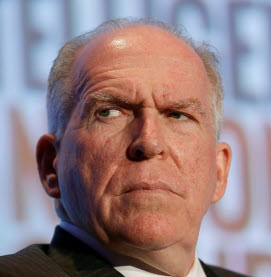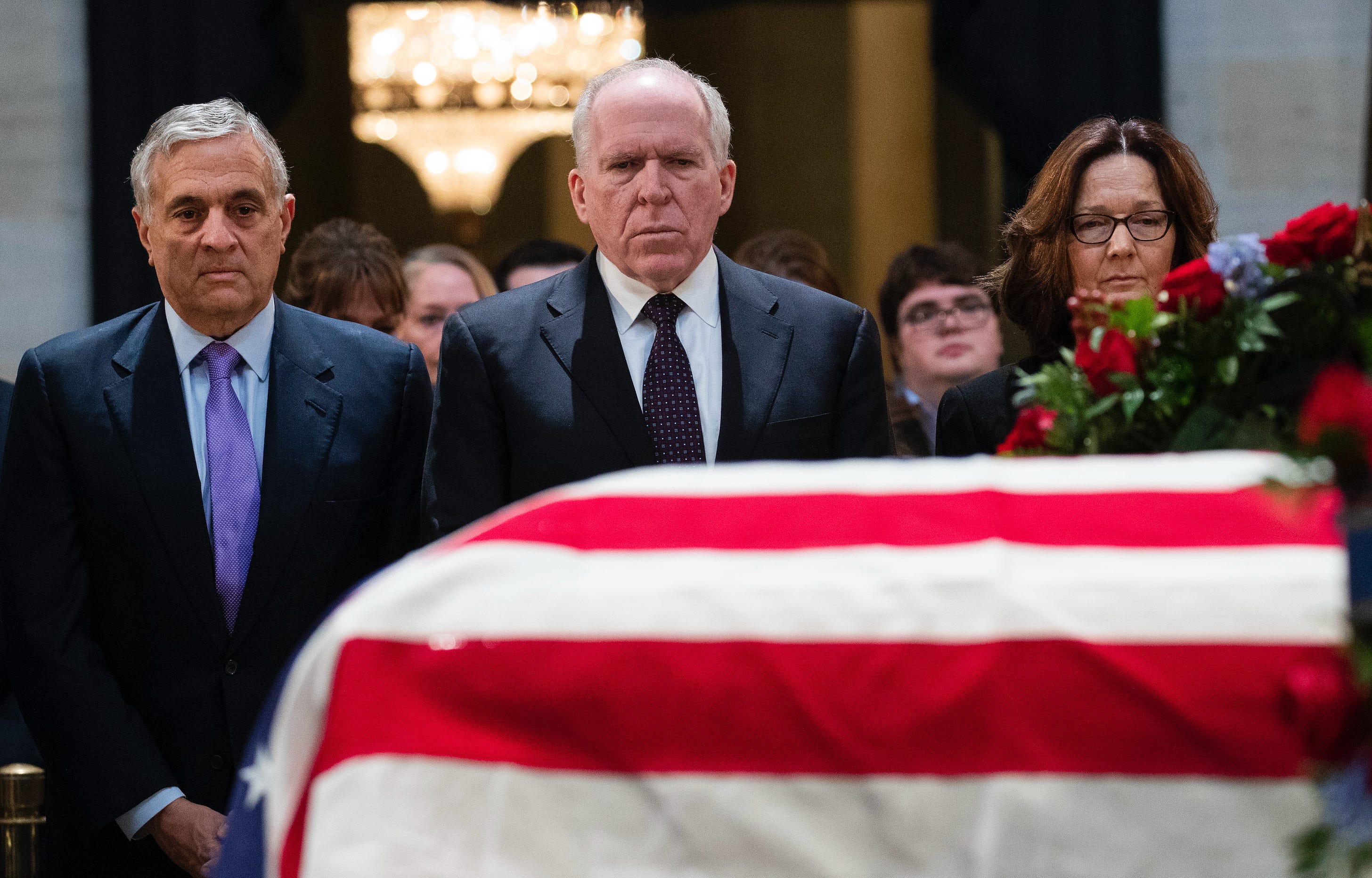Why Even Democrats Should Care About the “Cooked Intelligence” Russiagate Scandal

The last time we let “sexed up” intelligence guide policy, we were led to war in Iraq. The 2017 Intelligence Community Assessment caused America to declare war on itself.VIA SUBSTACK, By Matt Tabbi, February 15th, 2024
Former CIA directors George Tenet (left), and John Brennan (center), and Gina Haspel (right) at the funeral of George H.W. Bush in 2018 In the New York Times on October 5, 2022, reporter Michael Gordon authored “C.I.A. Says Iraq Revived Forbidden Weapons Programs After the U.N. Inspectors Left.” It reported “a classified National Intelligence Estimate on Iraq’s programs to make weapons of mass destruction was provided to Congress early this week,” and quoted an unclassified summary of that Estimate, or NIE, saying “although Saddam probably does not yet have nuclear weapons… he remains intent on acquiring them.” A month earlier, Gordon worked with Judith Miller to co-author what was to become an infamous article, “U.S. Says Hussein Intensifies Quest for A-Bomb Parts.” That piece was based on interviews with George W. Bush administration officials who previewed the public case for war, claiming “Iraq has sought to buy thousands of specially designed aluminum tubes” that “could be used to make centrifuges to enrich uranium.” Miller and Gordon added that technical specifications “persuaded American intelligence experts” that the attempted tube purchases were for Iraq’s nuclear program. Both articles were important parts of the Bush administration’s case for war, but the second was more impactful than the first. Everyone knew the White House was hot to take out Hussein, but news that a major intelligence report backed the administration’s belief about a reconstituted Iraqi nuclear program suggested widespread agreement across government about the White House’s conclusions. The CIA’s “intent on acquiring them” line was critical in helping Bush build public consensus and gain congressional approval to attack. As Gordon noted, the report came at “a critical juncture in the Congressional debate over the possible use of force.” As it turned out, the 2002 NIE was a pioneering effort in a new form of executive mischief, one that wedded selective releases of classified research to suppression of dissent to build public cases for action, with secrecy rules guaranteeing long delays between initial public deceptions and later disillusioning revelations. This practice is at the center of today’s Racket/Public story about how the January 6, 2017 report that “Cooked the Intelligence” to hide that Russia didn’t fear a Clinton presidency, and people of all political persuasions should care about it because the corruption issue isn’t partisan. This is a process problem, and what was laid out to us about the crooked techniques used to “cook” the last surviving myth of the Russiagate era — that Vladimir Putin ordered an “influence campaign” to help Trump — could be used by any party, any administration, any group of intelligence officials seeking to use a bogus pretext to do something nasty. Using dubious foreign conclusions to buttress the initial domestic campaigns is part of the pattern. The October 2002 American report on “Iraq’s Continuing Programs for Weapons of Mass Destruction” was written on the heels of a British assessment from September 24, 2002, that among other things claimed that some of Saddam Hussein’s WMDs were ready for deployment “within 45 minutes of an order to use them.” Not until a year later, in August of 2003, did reports begin to emerge sourced to British dossier scientist David Kelly that the UK assessment had been “sexed up.” British journalist Alistair Campbell described talking to Kelly, who said he’d been told a week before publication that the British report was insufficiently exciting. From the Guardian:
For the U.S., the WMD story fell apart on the ground in Iraq, where searches came up empty, but it also fell apart on paper, as intelligence secrets began to leak out. On July 25th, 2003, after the invasion, a paper called “Declassified and Released Excerpts of the October 2002 National Intelligence Estimate on Iraq,” was released that began to hint at things the public wasn’t told in October 2002. Lines like We have low confidence in our ability to assess when Saddam Hussein might use WMD stood out. Only in 2015, when the 2002 NIE was finally declassified, did we find out how badly our own intel had been “sexed up.” A remarkable array of crude tricks was used to manipulate opinion toward invasion. A little white-out transformed “We judge that Iraq has continued its weapons of mass destruction (WMD) programs” into the far more convincing pre-invasion line: “Iraq has continued its weapons of mass destruction (WMD) programs.” The early NIE also redacted dissenting opinions from the Department of Energy, the Air Force, and the intelligence wing of the State Department, the Bureau of Intelligence and Research (INR), reduced to a distant implication in lines like “most analysts assess” or “most analysts believe.” Officials even added lines for the public’s benefit only about Saddam having biological agents capable of threatening “the US Homeland.” It was all a scam. The manipulation of Iraq intelligence remains, for modern Democrats, the archetypal corruption story of our century. It’s the unforgivable sin that sullied Bush forever in our eyes and also, incidentally, helped launch “constitutional lawyer” and Iraq critic Barack Obama to the White House over Hillary Clinton, who saw the classified NIE and voted for the war anyway. The “sexed up” British scandal will forever be a black mark on Labor Prime Minister Tony Blair, once slated for historical honors as a paradigm-shifting “Third Way” politician. It therefore makes no sense that Democrats and progressives on both sides of the pond shouldn’t be horrified by the story of how the 2017 ICA was corrupted, a tale that we also learned this week followed an equally upsetting campaign of political espionage targeting at least 26 Trump aides and associates. The story released in Racket and Public today is remarkably similar to the 2002 disaster, and likely worse. In the 2017 “Intelligence Community Assessment” which is the subject of today’s piece, dissent wasn’t just confined to the classified version and kept from the public, but rather pre-empted entirely. Here, the State Department’s INR was barred from participating in the analysis process, as was the enormous Defense Intelligence Agency (DIA), which has coverage responsibility for a supposed key player in the Russian influence story, the GRU. This is why it was, in fact, a big deal when news agencies erroneously reported that “17 agencies” backed the ICA instead of three, as Clapper later conceded in testimony. An assessment of Russian activity based on opinions from all 17 agencies would almost certainly have been as riddled with dissent as the Iraq NIE. Former Ambassador to Russia Jack Matlock claimed years ago that the INR was kept out because “it did, in fact, have a different opinion” on the central question of Russia’s motives. One source I spoke with for this story said the same thing, while another suggested CIA chief John Brennan barred the INR out of concern about leaks. The structure of the informal ICA, a more “agile” intelligence product that’s come in vogue only recently, allowed Brennan and Director of National Intelligence James Clapper to create a “hand-picked” team of analysts that included the likes of Peter Strzok, the senior FBI counterintelligence official who ran the investigation targeting Trump. Brennan couldn’t secure unanimity even within this group, as Admiral Michael Rogers of the NSA and at least two senior CIA Russia experts refused to sign off on the conclusion that the “influence campaign” was undertaken to help Trump. Even James Comey didn’t endorse this crucial idea until mid-December, 2016. In fact, the FBI leaked statements to the contrary to the New York Times days before the election. Only two things keep this week’s damning portrait of political spying and whitewashed intelligence from the 2015-2016 campaign cycle from being thought of as a Watergate-style scandal (or worse, given how many institutions and senior officials were involved). One, the victim is Donald Trump. The other is timing. Perpetrators had a long head start on PR, pumping out leaks that drove a coverup narrative before the inexperienced Trump team even knew they were dealing with a dirty tricks campaign. Thanks to an accomplice press, deceptions were allowed to percolate in some cases for years, effectively “pre-bunking” mainstream audiences against revelations of corruption. The difference between Watergate and Russiagate is that Watergate was run by a private cadre of Richard Nixon dingbats who were paid on the sly out of Nixon’s Committee to Re-Elect the President (CREEP) and had to commit a “third-rate burglary” to bug the offices of the Democratic National Committee. In Russiagate, the bugging and spying was done with approval of whole institutions, including the CIA, FBI, and the intelligence services of numerous foreign allies, most notably Britain’s GCHQ. In fact, the worst activity was only pulled off when senior officials in bureaucracies like the Department of Justice overrode objections of rule-following subordinates. The informants used to set up Trump associates like George Papadopoulos and Carter Page for surveillance were extravagantly compensated, by a combination of the Hillary Clinton campaign, the FBI, and the Department of Defense. It was “state-sponsored oppo research, at penthouse prices,” as one intelligence source put it. If the public had first learned this backstory — which by now can be pieced together with ease through public documents — it would almost certainly have been a major scandal in the other direction. But because these institutions involved were able to engage in so much proactive leaking, and block or delay the release of the classified true story, they were able to create the false narrative without facing consequences. For instance, one lonely Justice Department official who reportedly objected to placing former Trump aide Carter Page under FISA surveillance was a Deputy Assistant Attorney General in the National Security Division named Stuart Evans. According to Justice Department Inspector General Michael Horowitz, Evans was concerned about seeking a wiretap on a “politically sensitive” target like Page, using information fed to the FBI by a hired researcher of Trump’s opponent, Clinton. Horowitz added that Deputy FBI head Andrew McCabe had to intervene to quiet Evans. “I hear you,” McCabe reportedly told Evans on October 19th, 2016. “But we can’t pull any punches, and we’ve got to do it… let the chips fall where they may.” Nearly eight years later, the chips have fallen, and virtually all of the figures who were involved in the original wrecking campaign escaped without criticism, let alone consequences. Worse, the intelligence community has suffered no consequences for a range of misdeeds, from the misuse of FISA authority to the manufacture of intelligence for a crucial Assessment. This matters because many who were involved the first time are positioned in the 2024 election season for new forms of mischief, from within government and without. Marc Elias, the Clinton campaign lawyer who hired Steele, is a key player in the filing of lawsuits targeting opponents of Joe Biden, doing everything from trying to redraw Wisconsin’s electoral map to preparing technical challenges for third-party candidates. Jake Sullivan, who as Clinton’s national security aide tweeted fake news about Trump’s supposed secret ties with Russia, is Biden’s National Security Adviser. Christopher Wray was Director of the FBI when the FISA mess was exposed, fired no one, and is still Director. Former Acting National Security Director of the Justice Department Mary McCord, who approved the Page FISA, was recently reported to be part of a “loose-knit” group exchanging ideas about how to “foil any efforts to expand presidential power” should Trump be re-elected. She also served on the FSIA court advisory panel, despite her role in the Page fiasco. Halper has never been forced to answer public questions. Brennan, Clapper, and other key players are television analysts, and most of the media players who pumped up this story are still on the air, a concern given that the Russiagate mutiny was in significant part a media operation. If you’re not convinced by the new reports, if you think all of this is partisan nonsense, that’s okay. We can agree that we should all want to see the remaining classified documents, so we can clear the air. We can’t afford to wait twelve years, like we did with WMDs. Whatever documents there are on this need to come out now, before yet another election season goes sideways. |

















What a crock! Yes, Bush cooked the books re Iraq invasion. There was considerable public pushback about this assessment. There’s nothing comparable re the Russia/Trump situation. Were it not for Bill Barr’s intentional misrepresentation of the Mueller report, Trump would have been convicted after his impeachment. Dissing Mark Elias is easy but challenging his work has proven virtually impossible. Courts, including those with Trump appointed judges, have consistently found for Elias and against Trump and his surrogates.
Elias’s time may soon be over as a voting “rights” advocate as the SCOTUS is likely to rule on whether private 3rd parties can sue. https://www.npr.org/2023/11/20/1152732216/voting-rights-act-supreme-court-section-2-private-right-of-action
Also, Barr’s characterization not withstanding, the House refused to impeach Trump and the evidence is clear now that the whole Russian hoax was an operation paid for by Hillary Clinton’s cabal.
Editor:
A couple comments on your critique of U.S. intelligence agencies with regard to their performance leading to the Iraq invasion and their inability to establish collusion between Trump and Putin..
In 2002 there was no reputable intelligence source that endorsed a concern for Iraq’s weapons program. The “concern” was politically generated in the White House. Your cherry picking of internet stories is hardly a persuasive technique to discredit intelligence professionals.On the subject of Putin’s attempts to influence U.S. elections on behalf of Donald Trump, you are correct that U.S. intelligence agencies have not provided a smoking gun to establish such a connection. However, given Trump’s narcissism-generated priorities, why on earth would he advocate (a) the dismantlement of NATO and (b) abandonment of support for Ukraine? These are clearly the number one and two priorities on Putin’s plate. Is Trump feeling compassion for a struggling Russia? Trump is not known for his compassion or charitable initiatives. Trump’s support for Putin is quid pro quo, the smoking gun that the intelligence agencies were unable to identify in the previous election.